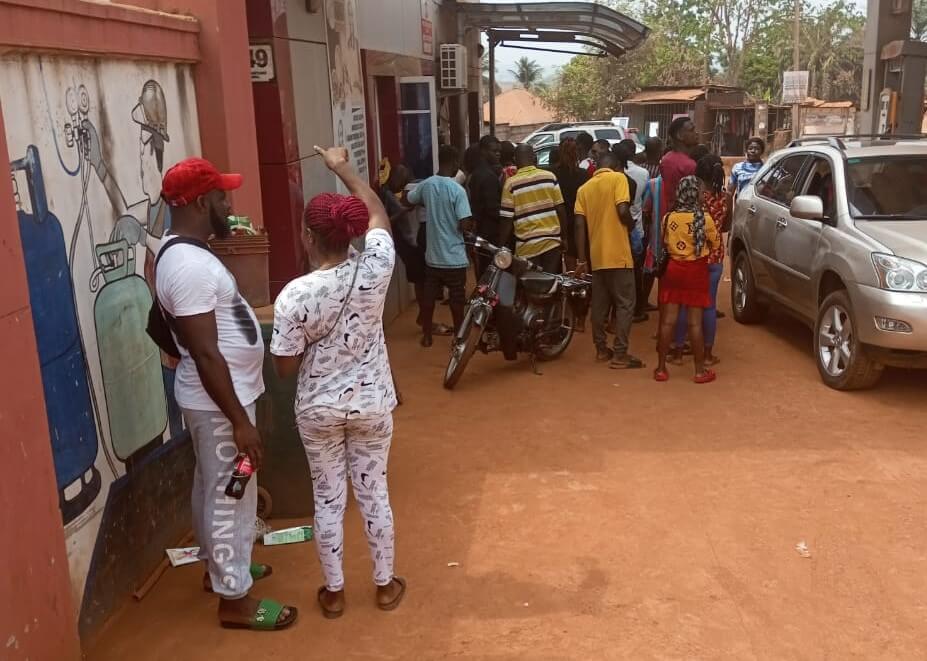No respite in sight as the scarcity of naira, the legal tender in Nigeria, bites harder across the country.
The Central Bank of Nigeria had, last year, embarked on the redesign of the highest three denominations of the local currency: 200, 500 and 1000 bills. It has given till February 10 for citizens to deposit their old notes with deposit money banks as old bills will cease to be legal tender after that date.
The problem is that money scarcity has arisen across the country because while old notes are being withdrawn from circulation, new bills are yet to be in good circulation.
This is due partly to the apex bank’s new cashless policy and its instruction to commercial banks not to release bulk amounts of new notes to the public to avoid money-bag politicians hoarding large quantities and using them to influence the outcome of the presidential and other elections that are less than three weeks away.
Hard times
In Anambra State, southeast Nigeria, residents battle with slimming access to their hard-earned money, while those who fought to get access could not withdraw as they wished.
One of them, Dada Michael, said, “This country is a disappointment. We struggle to make money, sometimes struggle to deposit it in the bank and now so much struggle to withdraw my own money”.
“I have been to several ATMs; they are not dispensing. The only one dispensing, people are too many there. I couldn’t wait”.
Michael had only one option: collect from the point of sale or POS agents. But due to the scarcity of notes, most POS agents don’t have the cash to give out.
The situation worsened because banks in Anambra State, like many other states of the southeast region of Nigeria, do not open for business on Mondays due to the worsening security situation in the area.
Anambra, hosting large markets such as the Onitsha main market (the biggest in West Africa) among other ones in Nnewi, Awka, and Ekwulobia, to mention just a few, loses several billions of naira to the subsisting Monday sit-at-home order dished out by the Indigenous People of Biafra, a group seeking a breakaway state (called Biafra) from Nigeria.
This has left residents and customers from other states across the federation with various economic losses. The state governor, Chukwuma Soludo, once said the state loses a whooping 19.6 billion naira ($45 million) to every enforcement of the sit-at-home order.
“Every day there is a “sit at home”, these poor masses lose an estimated N19.6 billion in Anambra alone,” Soludo said.
Since the hardship trailing the naira redesign and cashless economic policy of the central bank started, pressure had been mounted on POS operators. One lamented how she was forced to buy old naira notes to give to her customers.
“All the while, I charged normally. But yesterday, I couldn’t source money anywhere, so I had to buy it myself. That’s why I am charging 150 naira on every 1000,” said Mama Ejima, as she is popularly called.
“My own is even cheaper. Others collect 2,000 on 10,000; some even collect more than that.”
President Muhammadu Buhari, while hosting the governors elected under his party’s platform, All Progressives Congress, on January 4, promised to resolve the situation in seven days. Nigerians earnestly anticipate relief in the coming days.
Nigeria is facing a severe scarcity of its legal tender, the naira, as the Central Bank of Nigeria (CBN) has redesigned the highest denominations (200, 500, and 1000 naira) and set a deadline for exchanging old notes. This has led to significant difficulties as the new bills are not sufficiently in circulation. Contributing to the problem is the CBN's cashless policy and restrictions on commercial banks to prevent large-scale hoarding by politicians ahead of upcoming elections.
The situation is particularly dire in Anambra State, where residents struggle to access their own funds. ATMs are often not dispensing cash, and point of sale (POS) agents are also facing shortages. Security issues in the region have compounded the problem, with banks closed on Mondays and significant economic losses due to enforced sit-at-home orders by the Indigenous People of Biafra.
The naira scarcity has led POS operators to source cash at higher costs and pass these expenses on to customers. Amidst increasing public pressure, President Muhammadu Buhari has promised to resolve the situation swiftly, with citizens hopeful for relief soon.






